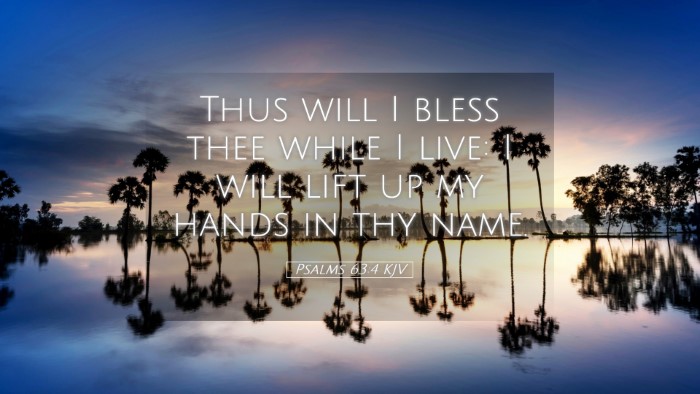Commentary on Psalm 63:4
Psalms 63:4 states, "So I will bless you as long as I live; in your name I will lift up my hands." This verse encapsulates a profound declaration of devotion and worship towards God. In studying this text, various public domain commentaries provide rich insights.
Contextual Background
This Psalm is attributed to David and is believed to have been written during his time in the wilderness of Judah, reflecting a phase of deep yearning for God's presence. David’s situation was one of dire physical need and spiritual craving, making his commitment to worship even more powerful.
Thematic Insights
- The Nature of Worship: David emphasizes the active participation in worship through physical gestures, notably lifting hands. This symbolizes surrender, adoration, and engagement with the divine.
- Continual Blessing: The phrase "I will bless you as long as I live" indicates a commitment to praise God through all circumstances, highlighting the essence of gratitude in worship.
- Divine Relationship: The psalm underscores an ongoing relationship with God, where worship is not merely a ritual, but a heartfelt response to His presence and greatness.
Commentary Compilation
Matthew Henry’s Commentary
Henry emphasizes the significance of worship coming from a place of need and desperation. He notes that David's commitment to bless God reflects a fervent desire to maintain communion with Him, even in dire environments. Henry writes that lifting of hands is a typical gesture of worship, expressing both need and reverence, and recognizes it as a means of attracting divine favour.
Albert Barnes’ Commentary
Barnes expounds on the phrase "as long as I live," suggesting that true worship goes beyond moments but encompasses a lifetime of devotion. He argues that this life of worship is not contingent upon circumstances but is an intrinsic part of a believer's identity. Additionally, Barnes notes that the act of lifting hands symbolizes not only praise but also a recognition of God’s sovereignty and care.
Adam Clarke’s Commentary
Clarke offers an interpretative perspective, viewing the act of blessing God as a response to the awareness of His goodness. He remarks that David, in his longing for God, expresses a commitment to worship that is rooted in personal experience and recognition of God’s mercy. Clarke also relates the lifting of hands to a cry for help and a posture of humility before God.
Theological Reflections
- Worship as a Lifestyle: This passage challenges believers to consider worship as a continuous life posture, not limited to specific events.
- Emotional Authenticity in Worship: David’s situation reminds worshippers to bring their entire selves—including their struggles—before God.
- God's Sufficiency: The act of blessing God in hardships is a testimony of His faithfulness, providing a model for believers to express their faith in all circumstances.
Practical Applications
This verse calls for reflection on how worship is expressed in our daily lives. Here are some practical applications:
- Daily Worship: Integrate moments of praise and thanksgiving into daily routines, acknowledging God’s presence in all aspects of life.
- Physical Expressions of Worship: Engage in physical acts of worship (lifting hands, kneeling) to enhance the experience of connecting with God.
- Commitment to Praise: Develop a personal commitment to bless God through various life stages, even in moments of trials.
Conclusion
Psalms 63:4 serves as a profound reminder of the importance of worship rooted in a relationship with God. The insights from noted commentaries underscore the concept that true worship transcends situations and emerges from a heart that seeks to bless God continually. For pastors, students, and theologians, this passage encourages deep reflection on the nature of worship and its vital role in a believer's life.


